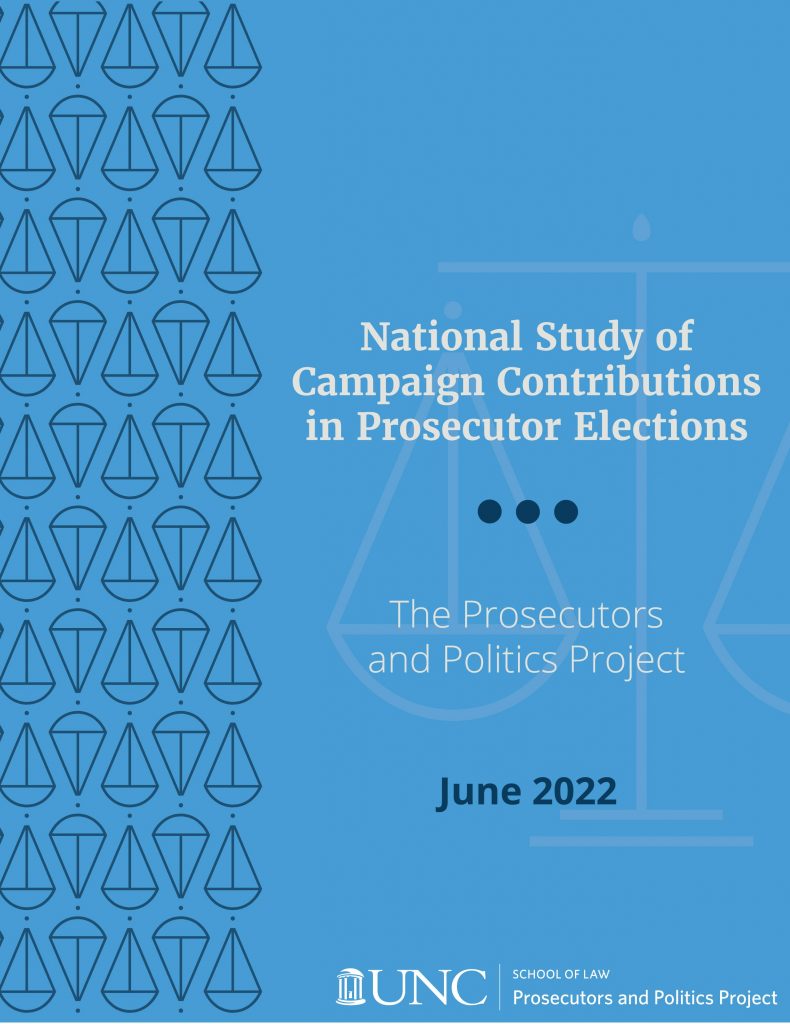Prosecutors wield significant power in the American criminal justice system. That power is subject to very few checks. Elections—are the only real check on prosecutors. The vast majority of state and local prosecutors are elected. How are prosecutors’ campaigns funded and why does that matter?
To dig deeper, the Prosecutors and Politics Project compiled a database that identifies who contributed to prosecutor elections and the amount of their donations. In June, the project released it’s National Study of Contributions in Prosecutor Elections. Contribution data includes data from jurisdictions that elected local prosecutors during the years 2012-2017. Campaign contribution information is often publicly available, but the format of that information varies from state to state, the information is often scattered across multiple sources, and the information is sometimes incomplete. The project compiled this fragmented data into a single nationwide database that will allow sustained study about who contributes to prosecutor campaigns and the amount of contributions.

Professor Carissa Hessick, director of the Prosecutors and Politics Project, answers questions about the the study and what can be learned from it.
Is this study the first of its kind?
Yes. Recent years have seen some scattered media reports about specific contributions in prosecutor campaigns. But ours is not only the first national study, but also the first systematic study of campaign contributions in prosecutor elections.
Why should the public be concerned about who is contributing to prosecutor campaigns?
Campaign contributions can provide a lot of important information to the public. For one thing, they can show where a candidate’s political support comes from, and that political support can tell us about the likely policies that a candidate may pursue in office. For example, a candidate who receives a lot of donations from law enforcement is likely to pursue different policies than someone who receives no donations from law enforcement. But perhaps most importantly, donations may reveal inappropriate conflicts of interest—such as when a district attorney takes money from the family of a person who has a criminal case pending before his or her office.
Who would benefit from contributing?
Aside from people who might have interests in particular cases, there are groups whose interests remain relatively static and who might take a special interest in prosecutor elections: specifically, the real estate industry, lawyers, the bail industry, and law enforcement. Real estate might seem to be an unlikely group to donate to district attorneys. But there are studies showing a relationship between property values and crime rates, and so real estate interests might be motivated to contribute to prosecutor campaigns promising a crackdown on crime.
It might be relatively obvious why lawyers (specifically defense attorneys) would want to contribute to prosecutor campaigns. Prosecutors commonly meet with defense attorneys before making that decision—perhaps the defense attorney can offer additional factual information or perspective that would make prosecution seem like a worse idea. But those meetings are not required and often do not take place. Perhaps if they donate to the district attorney, then it is more likely that a defense attorney would be granted that meeting or more likely that the arguments raised against prosecution would be taken seriously.
The bail industry might also care about prosecutor elections because prosecutors can affect whether bail is set and how high. Prosecutors have discretion over what charges to bring, and the type of charges often affect how high bail is set. Prosecutors can also make recommendations about bail amounts to judges, and judges will often take those recommendations seriously. These decisions can have a big impact on the profit margins of the bail industry. After all, bail bond companies make more money when the bail amount is set particularly high—the higher the bail, the fewer people can afford to pay it themselves and the higher the fee that the bail bond company can charge. If a prosecutor chooses to end cash bail or just not to pursue bail for certain offenses, then the bail bond industry will suffer.
Law enforcement officers might want to donate to prosecutor elections because they likely care about how the people that they arrest will be charged. They may also care about how prosecutors deal with allegations against officers who use unwarranted force against civilians. Especially because some candidates have been running on platforms that include holding police accountable for those uses of force.
Interestingly, while our study found that lawyers contribute a lot of money, we found that real estate and law enforcement contribute comparatively little, and the bail industry barely any at all.
What are the five biggest takeaways from the report that would be of interest to the national media?
1. Incumbents outraised challengers nearly 2 to 1.
2. The fundraising advantage of incumbents vs challengers is more pronounced when population size increases. The advantage is only 10% in the smallest districts. The advantage is 4 to 5 times as much in the larger districts.
3. Candidates who ran on platforms of criminal justice reform tended to raise more money. Three of the five top-grossing candidates ran on reform platforms–Kim Foxx, Kim Ogg, and Eric Gonzalez.
4. The candidate who raised the most money was much more likely to win a contested election. The relationship was most pronounced in the largest districts, where the top fundraiser won 79% of elections. And the difference in how much money the winning candidate raised (as compared to losing candidates) also increased significantly with population size.
5. Raising the most money seems to matter the most for candidates who are not incumbents.
Incumbents who were outraised still managed to win their election 38% of the time. Challengers who were outraised only won 20% of their elections.
Are there examples where campaign contributions have gotten a prosecutor in trouble that we can use as an example?
Definitely. The former Manhattan District Attorney Cy Vance took money from some defense attorneys who had big cases pending before his office, and then it appears that he didn’t have those cases go forward. Former Los Angeles DA Jackie Lacey took a contribution from a family whose son had pending murder charges, as well as others accused of crimes. And the DA in Alameda County, CA took a big contribution from a police union while their officers were under investigation for shooting a teenager.
What made you want to look at this data and what do you hope people will do with it?
In recent years, we’ve seen a lot of media coverage about money in prosecutor elections. Most of that coverage focuses on money from police unions or criminal justice reform advocates like George Soros. As I was reading that coverage, I realized that it was difficult to put those stories in context because we didn’t know anything about what campaign contributions in prosecutor elections look like. In fact, we know very little about prosecutor elections at all. And so this study, like the other work we do at the Prosecutors and Politics Project, is designed to gain more insight into the role of prosecutors in our democratic society.




